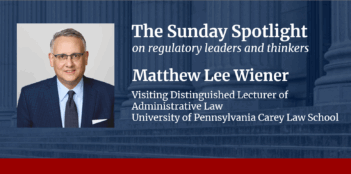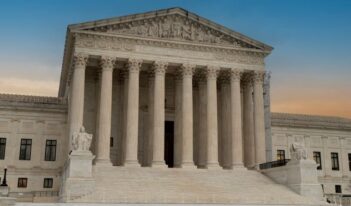
American doctrines of judicial review may provide useful models for Brazilian courts.
In Brazil, judicial review of administrative decisions is based on broad and ill-defined parameters. In general, any administrative decision is subject to judicial review, but it may be invalidated on review only if it is arbitrary or an abuse of discretion. The prevailing review pattern in Brazil is a “hard look” review resembling the arbitrary and capricious test in U.S. administrative law.
For independent agencies, judicial review in Brazil is substantially narrowed by agencies’ technical discretion—namely, agencies’ discretion in exercising their regulatory powers over a regulated sector. The Brazilian judiciary’s recognition of the technical nature of many administrative actions recommends a broad and qualified judicial deference to an agency’s decisions related to the technical aspects of the statute administered by the agency, as long as judges are presumably unfamiliar with some regulatory issues. Administrative agencies in Brazil clearly have “the benefit of specialized experience,” to quote the U.S. Supreme Court in United States v. Mead Corp.
The Brazilian Supreme Federal Court (STF) has recently reaffirmed its standard of judicial deference by stating that an agency’s technical expertise and its institutional capacity requires a deferential attitude of the judiciary, so courts should be limited to examining if the agency decision is arbitrary and according to the law.
In short, the Brazilian model of judicial review of agency decisions is twofold: In step one, the Court initially asks whether the agency interpretation is in accordance with the law it administers; if the answer is affirmative, then, in step two, the court accords deference, as a rule, to the agency’s judgment.
Brazilian judges, however, decide whether to apply technical discretion when reviewing an agency interpretation case by case. That has led Brazilian judges reviewing agency decision-making to apply the standard of technical discretion indiscriminately, whether it is a procedural or a substantive review. There is no other precisely defined judicial review standard and judges recurrently decide some matters de novo although an agency has presented a reasonable construction of the statute.
This simple judicial review model resembles the approach to deference the U.S. Supreme Court articulated for agency interpretations of their statutes in Chevron v. Natural Resources Defense Council. But Chevron is based on a precise two-step model. More importantly, it is not a secluded doctrine, steering judges’ decisions: The U.S. Supreme Court has numerous doctrines that speak to judicial deference to agency action.
These doctrines have been set on a series of landmark precedents. For example, the Court’s early decisions in Securities and Exchange Commission v. Chenery Corporation and Skidmore v. Swift & Co. attended to standards for judicial deference to agencies’ decision rationales. Vermont Yankee Nuclear Power Corp. v. Natural Resources Defense Council reined in courts’ authority to impose additional procedures on agencies. Although decisions such as Citizens to Preserve Overton Park v. Volpe and Motor Vehicles Manufacturers Association v. State Farm Mutual Automobile Insurance Co. called for the courts to probe agencies’ factual and policy justifications, they specifically say that the courts should not substitute their own policy reasoning for that of the agency. Finally, Chevron and Mead articulated a strong deference to agencies’ interpretations of ambiguous statutes, while the earlier Bowles v. Seminole Rock & Sand Co. and more recent Auer v. Robbins laid down a doctrine that courts should defer to an agency’s interpretation of its own ambiguous regulations.
Earlier this year, the U.S. Supreme Court revisited judicial deference in Kisor v. Wilkie, a case in which the petitioner James Kisor asked the Court to overrule Auer and Seminole Rock. Unlike Chevron, which addresses agency interpretations of ambiguous statutes, Auer and Seminole Rock instructed courts to defer to agencies’ reasonable interpretations of their own ambiguous regulations. An overruling of Auer, however, might have otherwise affected Chevron and undermined agencies’ interpretative power more broadly. Both decisions instruct courts to defer to an agency interpretation: either an interpretation of an agency’s own regulation as in Auer, or an interpretation of a statute an agency administers as in Chevron.
In the oral arguments in Kisor, held in March and in a series of previous decisions, Justices Roberts, Thomas, Alito, and Gorsuch signaled their disapproval of the Auer doctrine and a willingness to reconsider it. The doctrine supposedly undermines the principle of separation of powers, by granting to an agency the power to regulate and interpret its own regulations. Nevertheless, in Kisor the Court upheld Auer and Seminole Rock—although arguably the Chevron two-step process may now be influenced by what has been called a “five-step Kisor deference doctrine.”
The Kisor decision may well influence the Brazilian deference model. Even though the Brazilian standard of judicial review of federal agencies action lacks systematization, the high court has already applied Chevron to give deference to agencies on dozens of decisions. The STF, in a recent decision about a Brazilian Health Regulatory Agency regulation prohibiting addition of substances intended to increase attractiveness in smoked tobacco products, reasoned that it was giving deference to the agency much as the U.S. Supreme Court did in Chevron. The STF did not explicitly follow Chevron’s two-step process, but it did give an adequate amount of deference to the agency interpretation by acknowledging that the Brazilian Congress had not directly spoken to the precise question at issue and that the agency had adopted a reasonable interpretation of the statute.
It should be clear that U.S. Supreme Court case law about deference is relevant and deeply useful to Brazilian legal issues related to agency action. At the same time that some U.S. justices and scholars have raised questions about the wisdom of too much judicial deference to administrative action, it appears that the U.S. Supreme Court’s longstanding tradition of judicial deference to administrative action may be influencing the redesign of previously ill-defined Brazilian standards of judicial review of agency action. Brazilian lawyers would do well to pay close attention to developments surrounding judicial deference in U.S. administrative law.





